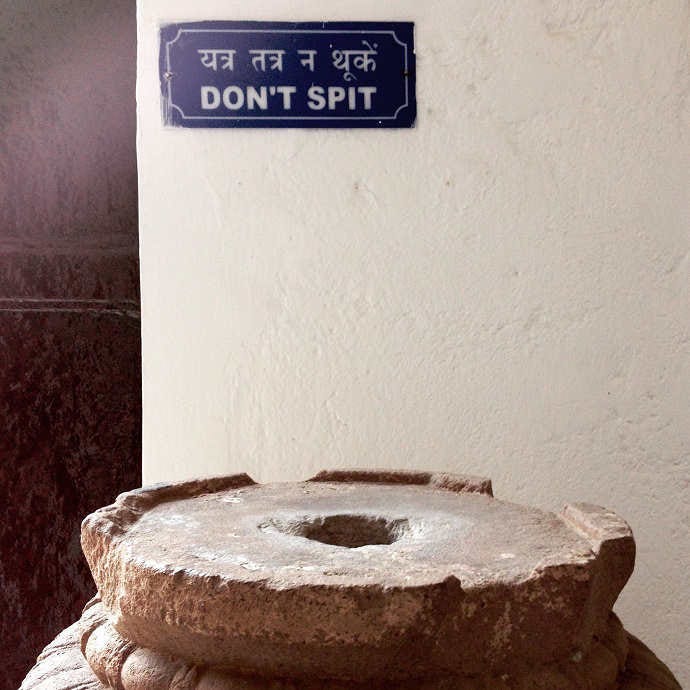Babudom Is A Foreign Country
Amitava Kumar on a special encounter with immigration officials.
by Amitava Kumar
Author’s Note: The editor at AntiSerious had been asking me to submit a piece. When I went to Patna, I took a notebook with me, hoping to take notes of phrases that I found odd or colourful. I had decided I’d give the editor a list of journal entries. I fell sick in Patna, then there was the wedding to attend, and I got distracted. The work wasn’t done. The two pieces of dialogue below were simply Facebook posts. A note from the AntiSerious editor reminded me of what I had originally intended to do. Only this photograph from the Patna Museum came to mind. I offer it along with the two snippets of dialogue with immigration officials (one at the Indira Gandhi airport in Delhi, and the second at John F. Kennedy airport in New York City). Encounters with immigration officers are mostly devoid of humour — or, to put it another way, any humour is unintentional and perhaps only retrospective. At the moment of the encounter, all too often, the person on the other side of counter seems officious, nasty, and arrogant. In front of the officer, we are required to be serious. But here we can celebrate at last what we really are — antiserious.
In the weeks after the September 11 attacks, I was questioned by a U.S. immigration official at the Canadian border. I had done a reading at St. Lawrence University and was crossing the border in my rented car. She asked me to step out of my car and then during a search found my book Passport Photos in my bag. “What is this book about and why are you carrying it?” she asked me. I resisted the temptation to declare that I had written the book. Instead, I provided a vague academic response, something about “a study of immigrant life.” And then added, “I was giving a lecture at the university nearby.” The official surprised me by asking if the book had instructions on how to make passports. I said no. I couldn’t tell her that my book was an attempt at crafting my own passport, where under chapter headings like “Name,” “Place of Birth,” “Date of Birth,” I had tried to give answers that one is never expected, or allowed, to give to the official at the border.
I was soon permitted to leave. I was relieved that the officer had not turned the book’s pages. There were a series of poems in the book entitled “Love Poems for the I.N.S.” (Till the September 11 attacks, the Immigration and Naturalization Service performed the role of our Godfather. Now we answer to the Department of Homeland Security.) If that official at the Canadian border had been a reader, she would have found in my book poems like the following:
“Do you intend to overthrow
the government of the United States
by force or fraud?”
An old man who wants to visit
a son in New Jersey
wants me to help him
with this question on the form.
A friend tells me later of someone
who believing it was an either/or question
tried to play it safe and opted
for the overthrow of the government
by fraud.
Fifteen years ago, I’d titled the introductory chapter of Passport Photos as “The Shame of Arrival”. As the experiences at the immigration counters below show, fifteen years later, I might have used the same title.
I. Babudom is a foreign country
Immigration official at Delhi airport (taking my passport): ‘There is camera here.’
Me: ‘Sorry?’
Official: ‘There is camera here. Remove your wallet from counter.’
Me (removing the wallet which I had put on counter with my boarding pass): ‘Oh, okay.’
Official: ‘No, it’s not okay. It is highly objectionable.’
II. Babudom in another country
Immigration official 1 at JFK: “Did you buy and bring back anything from India?”
Mona, my wife: “Textiles, some clothes …”
My five-year-old interrupts with a shout: “Sword!”
Me: “It is a toy….”
Immigration official 2 standing nearby: “Sword! At first I thought he said fraud.”
Mona (laughing loudly): “Funny.”
Immigration official 2: “I can’t decide whether you are laughing so much because I’m funny or because it’s true.”
Mona (laughing with some fake enthusiasm): “Oh my God!”
Immigration official 2: “No, really.”
Amitava Kumar is a writer and journalist. He was born in Ara, and grew up in the nearby town of Patna, famous for its corruption, crushing poverty and delicious mangoes. Kumar is the author of several books of non-fiction and two novels. He lives in Poughkeepsie, in upstate New York, where he is the Helen D. Lockwood Professor of English at Vassar College. In 2016, Amitava Kumar was awarded a Guggenheim Fellowship (General Nonfiction) as well as a Ford Fellowship in Literature from United States Artists.
Kumar is the author of Lunch With a Bigot (Duke University Press, 2015, and Picador India, 2015); A Matter of Rats (Duke University Press, 2014 and Aleph Book Company, 2013), A Foreigner Carrying in the Crook of His Arm A Tiny Bomb (Duke University Press, 2010; also published as Evidence of Suspicion, Picador India, 2010); Nobody Does the Right Thing (Duke University Press, 2010; also published as Home Products, Picador India, 2007); Husband of a Fanatic(The New Press, 2005 and Penguin-India, 2004), Bombay-London-New York (Routledge and Penguin-India, 2002), and Passport Photos (University of California Press and Penguin-India, 2000).



